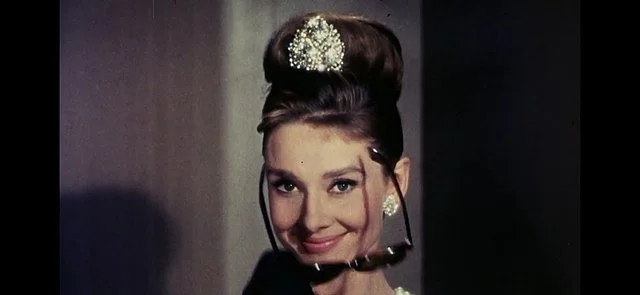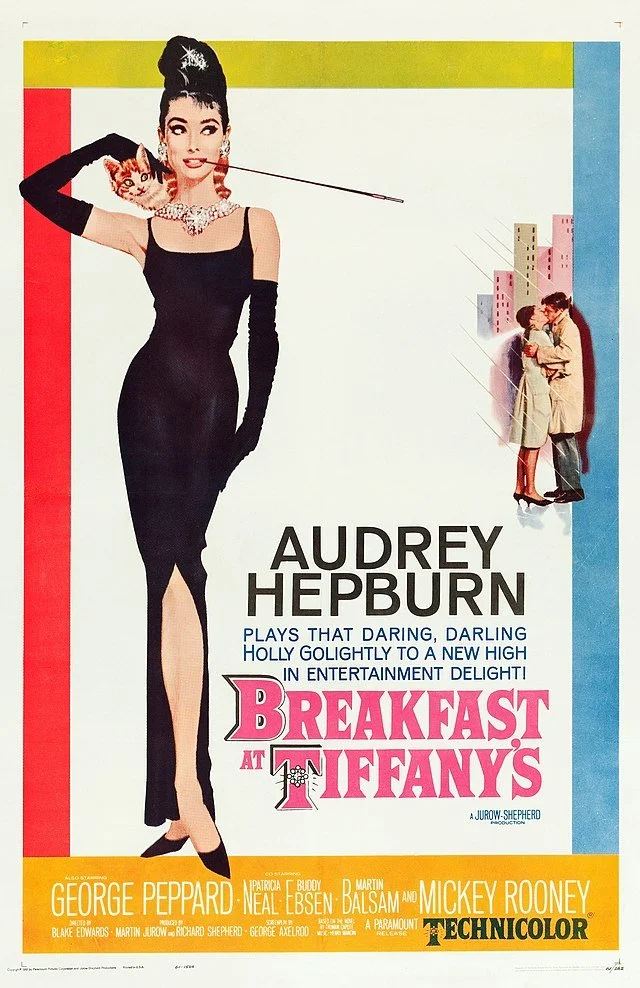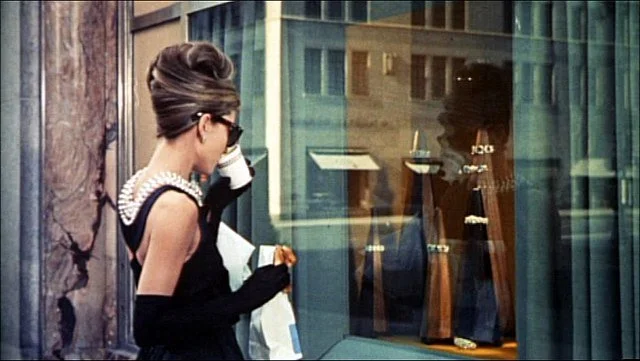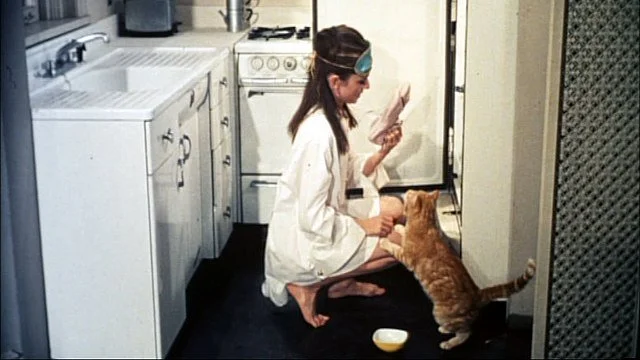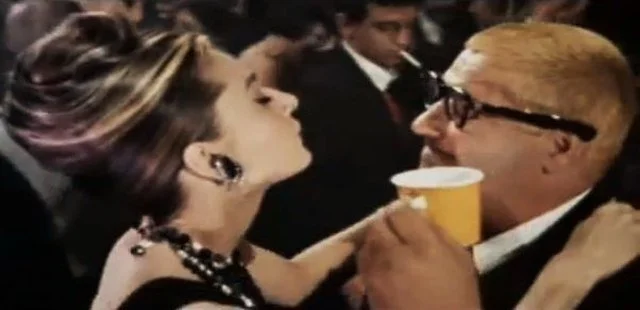I see myself in this fabulous fictional character
“You want to know the story of my life? It goes like this: I knew better but I did it anyway.”
— RE:BOOKS
“Ýou’ll say we’ve got nothing in common… And I said what about Breakfast at Tiffany’s? She said yes I remember the film. As I recall we both kinda of liked it. And I said well that’s one thing we’ve got”
— Lyrics of the song “Breakfast at Tiffany’s,” by the band Deep Blue Something.
I’m about to share my all-time favourite fictional character in any novel I have ever read since I began reading at age three.
I’ll give you a hint: I don’t take this “lightly.”
Not many, it seems (including avid readers and bookworms) are able to answer this, annoyed that the question “Who is your favourite fictional character?” was even asked at all.
I’m so curious why this is. I’ll tell you happily.
My all-time favourite fictional character is Holly Golightly.
Holly Golightly is utterly fabulous! (She even makes smoking look fabulous, that’s how fabulous she is.)
Holly Golightly is the main character in Breakfast at Tiffany’s, authored by Truman Capote in 1958 originally as a novella (a short novel or a long short story) from the POV of an unnamed narrator about a free-spirited young girl named Holly Golightly, who is living her life on her own terms, regardless of what anyone thinks about her.
Holly Golightly did what she wanted — selfishly, some may say. But she got away with it thanks to her comical clumsiness and kooky charm.
In the book, one of her suitors describes her as “a phoney. But on the other hand…she isn’t a phoney because she's a real phoney. She believes all this crap she believes. You can’t talk her out of it.”
“Who is your favourite fictional character of all time?” can seem like an impossible question to answer. One that if you were asked right now, you would probably need to take a beat, look to a higher power for help, or react like you’re back in high school, picked in class to answer a question, but you have no idea what the question is, and forced to give up and admit defeat.
So much so that I find most people will act so stumped that their answer will end up being a copout maddeningly vague and non-specific. “I can’t possibly name my favourite character! There are too many good ones!” Or, “I can't answer that! It's like asking who my favourite child is!”
My best guess is that maybe, people just don’t want to share this information out of fear of embarrassment. (Or that people will think you’re insane because they hate your favourite character.)
To share my favourite fictional character is to expose myself.
If you share who your favourite fictional character is, openly and proudly, there is a good inevitable chance others will judge you and then diagnose you with incurable narcissistic personality disorder.
People will assume that by outing your favourite fictional character, you are somehow admitting that your favourite fictional character embodies a set of characteristics, has an enviable personality or lives desirable experiences that you, the reader, don’t. (Ie. “Who the hell do you think you are to dare compare yourself to such an iconic character like Holly Golightly?)
You’ll be judged, basically, for admitting your favourite character is a person you aspire to be IRL. By naming your favourite fictional character, others may assume that’s how you see yourself - or as an ideal version of yourself.
Breakfast at Tiffany's (and the character Holly Golightly) was introduced to me by a male teacher in my last year of high school who asked if I had read it as I was walking out of class.
It wasn’t on a reading list. It wasn’t required reading. I wouldn't get any extra credit for reading it. It wasn’t even an English teacher who asked if I had read it. And at the time, it didn’t seem creepy at all for a male teacher to recommend a novel with the main character, who is an escort. (Which we will get into.)
So, I can only assume I was given this specific book recommendation — and encouraged to read it — because the fictional Holly Golightly reminded this teacher of me or my antics. Or, the fact I would do or say Holly Golightly-like things.
Whatever. I inhaled read it. It was basically a “setup” with a fictional character.
So, since my late teens, I’ve always known who my favourite fictional character is. I fell in love with her immediately when I “met” her on the page while also thinking, “Dear G-d! What could I possibly have done to make my (male) high school teacher think I would resonate with Holly Golightly?”, a character I’d describe as comic-relief.
Admittedly, I did resonate with her. Holly Golightly was the fabulous fictional equivalent of who I felt I was then — how I acted, how I thought, etc. She was a character I wanted to be like or was already like (again, aside from the escort part…).
So, I’ve never had to struggle to answer the question about my favourite fictional character, at least since I was first introduced to her in my late teens. I can also understand why asking about favourite fictional characters can render readers speechless. And it’s not because there are too many of them.
I know. I've tried asking.
I’ve asked many of my bookworm friends who their favourite fictional character is, and most look at me as perplexed as the expression on my face must look when my kids ask me questions like, “Why is a cow a cow?” Or “What’s for dinner?”
But think about this: If I asked, “Who is your favourite actor?” or “Who is your favourite musician” or “Who is your favourite supermodel?” Or, “Who is your favourite athlete?”, I’m sure you can name an answer without breaking into a sweat any effort at all.
So, why is admitting your favourite fictional character so daunting?
I’m not embarrassed that Holly Golightly is my all-time favourite character. Not in the least. Even if it somehow feels quite intimate, as if I’m somehow letting you see through a door into me and my life. But not as intimate as Prince Harry sharing how he lost his virginity in his memoir Spare. (In a field behind a pub to an unnamed older woman who treated him ‘Not unlike a young stallion. Quick ride, after which she'd smacked my rump and sent me off to graze.”)
Don’t forget to check out part three for a review and some key takeaways from this record-breaking memoir that sold more than 1.4 million copies in Canada, the U.S., and Britain, on its first day of sales.
Holly Golightly may be my all-time favourite fictional character. But she was not created by one of my favourite authors. I think this is worth noting. It’s kind of like when a movie wins an Oscar for Best Actor, Best Director, and Best Screenplay but not Best Film. (This has never made sense to me.)
Holly Golightly, like me, is slightly ridiculous and easily bored by superficial conversations and is oh-so spontaneous. (I consider small talk a drag. Please don’t talk to me about the weather or your step count. To me, it’s as fascinating as saying, “I notice you’re wearing a shirt.”)
I often spontaneously book vacations two days before if the urge to travel hits. I surprise my kids with ditch days, spontaneously busting them out of school to go racecar driving or to a movie, much to their my excitement.
Even Holly Golightly’s name portrays a careless spirit. On her mailbox, the narrator points out her name slot reads, “Miss Holiday Golightly; Travelling.”
If you prefer retail over reading, Holly Golightly introduced readers to the fabulousness of The Little Black Dress (LBD). Like Holly, the LBD is both complicated and not so complicated. Like a LBD, Holly Golightly symbolizes classlessness, timelessness and boldness. She is the reason why I own about 40 Little Black Dresses. (Plus, all women know the saying that you can never be over-dressed or underdressed with a LBD. So when in doubt, wear black!)
And although she is beguiling, entertaining, flaky, flirty, seductive, and kooky, she’s also funny AF.
“But it’s Sunday,” she says at one point. “Clocks are slow on Sundays.” And, “Thursday! It can’t be! It’s too gruesome!” (I never know what day of the week it is either.)
But she's also unknowable and untameable, self-aware enough to describe herself as a ‘wild thing’ who fled to New York from a troubled hillbilly upbringing in Texas to reinvent herself.
“You call yourself a free spirit, a wild thing and you’re terrified somebody gonna stick you in a cage — well, baby, you're already in that cage You built it yourself…it’s wherever you go, because no matter where you run, you just end up running into yourself,” Holly Golightly says.
On another more (go)lightly note?
Capote saw Holly Golightly as his “greatest creation” — a female character who represented female independence rarely seen in the mid-20th century.
So, 19-year-old Holly Golightly’s sense of untethered freedom is a central theme of Breakfast At Tiffany’s and is the essence of Holly Golightly.
Holly Golightly is adoringly flighty and ultimately lovable like me. She throws wild parties — the type of party I’d like to crash — and she flirts with almost every (rich) man she meets.
But she's also restless, too, paying little attention to what other people expect of her, and knowing. One may say she dared men to argue with her when she wakes the narrator at two in the morning, after losing her key, for example.
“I suppose you think I’m very brazen. Or tres fou. Or something,” she says to him, disappointed when the narrator responds, “Not at all.” (Tres fou is french for “crazy,” “mad,” “fool,” “insane.”)
“Yes you do. Everybody does,” Holly Golightly retorts. “I don't mind, it's useful.”
(“Some people never go crazy,” Charles Bukowski once said. “What truly horrible lives they must lead.”)
Around 30,000 copies of Breakfast At Tiffany’s are sold every year. Apparently, the story of a young woman trying to establish a glamorous identity in order to navigate the treacherous setting of New York City is a popular character that many others also adore. (Along with adoring her enormous dark sunglasses and string of pearls.)
The novella was turned into a movie by the same name in 1961. Although the endings couldn’t be more different, both still sparkle like a Tiffany diamond.
Both the novella and the movie are as memorable as the Tiffany blue-coloured jewelry box.
(Fun fact? The film was the first time Tiffany’s had ever been used as a filming location, opening their doors on a Sunday for the first time since the 19th century so scenes could be shot.)
The movie, starring Audrey Hepburn as Holly Golightly, was nominated for six Academy Awards and won five. In 2006, Christie's South Kensington set a world record by auctioning off the black gown made for Hepburn that she wore in the opening scene for $923,197.
Hepburn’s role as Holly Golightly turned the actress into an icon and role model for young women like me, who fantasized about moving to New York to live the same freewheeling, urbane lifestyle. (Which I did.)
The opening scene in the film, with Moon River playing in the background, shows Holly staring into the window of Tiffany’s. The jewelry store is Holly's escape, her refuge and the place she visits where she feels entirely safe from the "mean reds" — by which she means the angst, anxiety, and depression that occasionally plague her.
Holly Golightly tells the narrator that alcohol doesn’t make her feel better, nor does marijuana or, for that matter, aspirin. The only thing that does help, she says, is going to Tiffany’s. “It calms me down right away,” she says, “The quietness and the proud look of it.”
As she peers lustily into a closed Tiffany’s, it may seem like she’s just woken up, but as her character shares, “I've never been for a walk in the morning before. At least not since I've been in New York. I've walked up 5th Avenue at 6:00 a.m, but as far as I'm concerned, that's still night.”
Although she socializes with the city’s elite, Holly doesn’t come from a wealthy background. She seems to take comfort in the “proud look” of the expensive jewelry store, finding its inherently soothing quality.
For Holly Golightly, wealth and opulence represent the contentment and comfortability that her life still lacks.
Holly was not only Capote’s favourite creation, but she was apparently a merge of the varying stylish women in Capote’s social circle, including Gloria Vanderbilt, Carol Matthau, Oona Chaplin, and Doris Lilly, who all claimed to be Capote’s muse for the character.
Even upon reading the publication, Capote’s mother, Nina, screamed, “It’s me! It’s me!”
Everyone, it seems, wanted to be Holly in The Holly Golightly Sweepstakes. Or at least wanted her ‘essence.’
Even if she was too honest for her own good.
“How can you bear it? It’s like a chamber of horrors,” Holly tells the narrator when she first sees his apartment.
“Oh, you get used to anything,” the narrator responds, his feelings clearly hurt, hearing her description of where he lives.
“I don’t. I’ll never get used to anything. Anybody that does, they might as well be dead,” Holly responds, as her disproving eyes survey his room.
This is the charm of Holly; it’s hard not to be enchanted by her. She’s an enigma — shallow on the outside but deeply complex on the inside.
Holly remains relatable on a deeper level. She speaks of what are mental health issues nowadays in a way that makes sense to everyone who has suffered from bouts of depression and me.
“The mean reds are horrible. You're afraid and you sweat like hell, but you don't know what you're afraid of. Except something bad is going to happen, only you don't know what it is,” she says, further explaining, “No, the blues are because you're getting fat or because it's been raining too long. You're just sad, that’s all. The mean reds are horrible. Suddenly you’re afraid and you don’t know what you’re afraid of. Do you ever get that feeling?
Who doesn’t?
Holly Golightly is always getting in trouble for losing her keys — waking up her neighbours by ringing their doorbells, at whatever hour, to let her in. She doesn’t see the point in making another copy. She justifies this by saying she’ll just lose them again. And, again, I can relate.
I recently moved. As embarrassing (or shocking) as this may be, I spent 15 of 17 years in my old house without my own key. I just kept losing them. Although I found a key dude willing to make a copy of my key illegally, I share Holly’s thoughts on this matter; “Meh. I’ll just lose them anyway. Someone will let me in.” And someone always did, just like Holly.
There are also many traits (and quotes) said by Holly Golightly in Breakfast at Tiffany's that resonated with me to the point that maybe I DO see myself as a version of Holly Golightly. I’ve been called quirky because I’m quirky.
But mostly, in my younger years, I felt restless too. I didn’t (or couldn’t) commit in relationships, let alone commit to a certain brand of shampoo.
Also, Holly had a cat she named ‘Cat,’ and I once had a roommate named her cat ‘Rabbit,’ which I thought was odd.
But Holly purposely doesn’t name her cat. She doesn’t feel she has a right to bestow her cat with a name. Holly and her cat, named ‘Cat,’ belong to each other in the same way that people do not belong to each other.
As Capote writes, “They are a couple of unnamed slobs. They belong to nobody, and nobody belongs to them.” Holly doesn’t want to give Cat a name until she has earned a life for herself and found a place that makes her feel like Tiffany’s — where her endearing child-like thinking is a place where nothing bad can ever happen.
“It calms me down right away, the quietness and the proud look of it; nothing very bad could happen to you there, not with those kind men in their nice suits, and the lovely silver and alligator wallets,” she declares. “If I could find a real-life place that made me feel like Tiffany’s, then I’d buy some furniture and give the cat a name.”
Holly is a terrible cook, too, like yours truly. When Holly invites the narrator to dinner and attempts to cook pasta, the results are so disastrous dangerous that they end up going out to eat.
And yes, Holly is also an escort. That may make her less relatable, but let’s not forget about our favourite Hollywood prostitute, Vivian, in the movie Pretty Woman — one of the most-loved romantic comedies of the 1990s and a favourite to this day.
So, Holly didn’t have a job, per se. (Except isn’t prostitution the oldest profession in the world?) She makes money by accompanying “expense-account men” to the best restaurants and nightclubs with the understanding that her escort is obliged to give her some sort of gift — which she called “money for the powder room.”
Her going rate for the “powder room” was $50, which in the late 1950s, would be about $400 today. Holly is given $50 "for the powder room" by her male acquaintance as payment for her companionship that evening.
However, she's not quite as promiscuous as it may seem. In the book, she confesses she's only had 11 lovers.
In another one of the most memorable scenes in Breakfast at Tiffany's, Holly shuts the door in a man’s face because while she'll happily collect the funds from a “dumb man who thinks he's entitled to her time because he gifted her money,” she's "not that kind of girl." (The type of girl who would argue that the tooth fairy is a prostitute by teaching children to sell their body parts for money? I’m kidding!)
One night, in Capote’s novella, Holly peeks through the crack of her door to offer advice say to an aggressive man who expects the night to continue, "The next time a girl wants a little powder-room change, take my advice, darling, don't give her twenty cents!”
Another memorable Holly quote? “I do not accept drinks from disapproving gentlemen.
While Holly Golightly is my favourite character in any work of fiction (and I do spend time with her, reading Breakfast at Tiffany’s at least twice a year), she is not only my favourite character because she’s Holly Golightly.
The character has to be someone — narratively speaking -- I want to spend time with, even if others find her toxic and manipulative.
First, there’s her name. It’s so instantly memorable as well as comical and captures her character. It sticks with you. In fact, there is a popular British singer/songwriter named Holly Golightly. Her mother named her after the fictional character.
So, there are so many things I admire about this fictional character that, in many ways, is like me. But, she could be my favourite because of Truman Capote’s seasoned and talented storytelling abilities, making Breakfast At Tiffany’s a riveting read about a riveting character.
Maybe Holly Golightly would still be my favourite character even if I didn't relate to her at all or if she didn’t have any redeeming qualities because Capote included all the aspects that make a good fictional character, including an unforgettable name, an unforgettable personality, and a character that is active, not passive, in the sense that Holly attempts to control her own destiny.
Good and memorable characters, like Holly, want things. They are motivated by desires, and they try throughout the story to fulfill them — even if other obstacles or characters stand in their way.
Capote successfully shows that despite all her confidence, Holly Golightly also has some fear. He writes brilliantly about her internal conflict and moral conundrums, leading readers to want to know the character’s questionable choices and if she’ll ever change.
A good character is complex because that means they are like real people who, for the most part, can not easily be summed up and are not predictable.
Real people are a little bit good, and a little bit bad, which makes for a whole lot of interesting secrets!
Holly has things she doesn't want to be revealed. And what comes out of her mouth, while often comical, shows she is smarter than she often pretends to be.
She’s more than just a party girl. She’s a self-aware party girl.
Don’t let the Givenchy dress fool you. That’s only Holly on the outside. Inside, she’s like most young adults, trying to figure her way out of her cage.
“No matter where you run, you end up running into yourself,” she says.
I’ll SPARE you any more information about my favourite fictional character. You can read all about her. Or you can hang out with me for an afternoon.
So, check out part three to read the reviews, some takeaways, and some British-isms in Harry’s memoir Spare.
You can also read Part Two to hear Maya’s opposing thoughts on this!
But if you do happen to have a favourite character, you shouldn’t be embarrassed.
Share who it is with me here!
Until next time, flip your hair and flip the page (and enter to win this week’s contest and buy yourself one of these Holly Golightly sleep masks!)
xo
Rebecca
